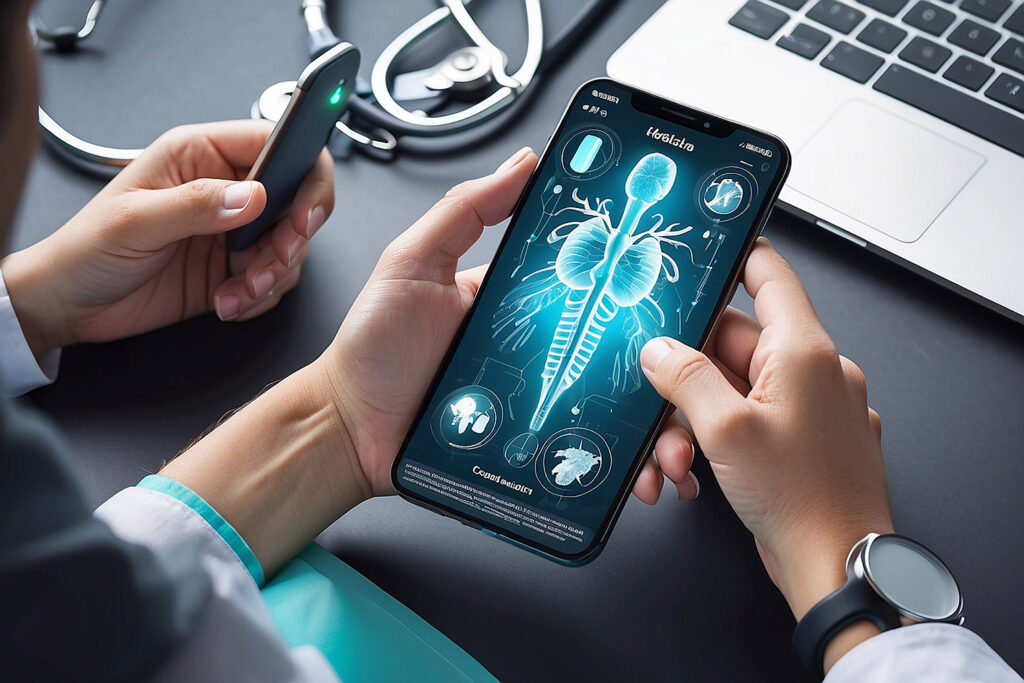The Latest in Health AI: Tools Revolutionizing Disease Prediction and Prevention
Introduction
The Latest in Health AI: Artificial Intelligence (AI) has made significant strides in recent years, increasingly impacting various aspects of our lives. In healthcare, the role of Health AI is particularly fascinating, as it has the potential to fundamentally transform disease prediction and prevention. From enhancing diagnoses to developing personalized treatment strategies, the latest AI-powered tools are shaping the future of medicine. In this article, we will take an in-depth look at the latest developments in Health AI and how they are revolutionizing healthcare.
The Rise of Health AI
The Development of Health AI
Health AI has advanced significantly in recent years. While earlier AI systems were based primarily on simple algorithms, modern systems use complex Machine Learning models and Deep Learning techniques. These technologies enable the analysis of vast amounts of health data to identify patterns that are invisible to the human eye.
2024 brings significant innovations in this field, particularly in oncology, cardiology, and neurology. Researchers and companies around the world are working on groundbreaking solutions aimed at improving both diagnostics and disease prevention.
Key Developments and Innovations
- Personalized Medicine through AI: AI has enabled the development of personalized treatment plans based on an individual’s genetic data. Companies like Tempus and Foundation Medicine use advanced AI algorithms to create precise therapy suggestions for cancer patients.
- Early Detection of Cardiovascular Diseases: The company CardioMe has developed an AI-powered system that predicts cardiovascular diseases by analyzing ECG data. The system can detect potential anomalies before they lead to serious problems.
- Neurological Diagnostic Tools: The company NeuroAI is working on an AI platform that can detect signs of neurological diseases such as Alzheimer’s and Parkinson’s based on imaging data and patient reports.
How Health AI Revolutionizes Disease Prediction
The Use of AI for Risk Assessment
A significant advantage of Health AI is its ability to perform risk assessment. AI-powered systems can analyze patient data from various sources, such as medical records, laboratory tests, and genomic data, to evaluate the risk for certain diseases. These technologies enable doctors to take targeted preventive measures and develop tailored treatment plans.
Examples of AI-Powered Risk Models
- IBM Watson for Health: This platform uses AI to sift through large amounts of data and extract relevant information for diagnosing and treating patients. It assists doctors in creating personalized therapy recommendations.
- Google Health’s DeepMind: DeepMind develops AI models that analyze medical imaging data to identify early signs of eye diseases and cancer. These models can often detect diseases years before the first symptoms appear.
AI-Powered Early Warning Systems
AI-based early warning systems are designed to detect early signs of diseases before they develop. These systems continuously analyze health data to identify anomalies and patterns that may indicate a potential condition.
Most Innovative Systems Overview
- VitalConnect’s VitalPatch: This wearable device continuously monitors vital signs and uses AI to predict potential health risks. It is particularly useful for patients with chronic conditions.
- Huma’s Remote Monitoring: Huma offers a platform for remote patient monitoring that uses AI to analyze health data and provide early warnings about potential health issues.
The Role of Health AI in Prevention
Preventive Health Strategies through AI
Disease prevention is a crucial aspect of healthcare, and Health AI plays a central role in this. By analyzing health data, AI systems can predict risks and recommend preventive measures tailored to an individual’s health status.
Examples of Preventive Measures
- Use of Wearables: Devices like Fitbit and Apple Watch continuously collect data on physical activity, heart rate, and sleep patterns. AI algorithms analyze this data to provide personalized health advice and early warnings about potential health issues.
- Personalized Nutrition and Fitness Plans: Companies like Noom and MyFitnessPal use AI to create personalized nutrition and fitness plans based on individual health goals and current health status.
The Importance of Data Integrity
For Health AI to be successful, data quality is crucial. Accuracy and reliability of collected data are essential for making precise predictions and recommendations. Therefore, companies and researchers place high importance on data integrity and data privacy.
Data Privacy and Ethical Considerations
The collection and analysis of health data also raise ethical questions. Protecting patient privacy and ensuring the security of collected data are of utmost importance. Legislators and companies are working to implement stringent privacy regulations and ensure that all AI applications are ethical and secure.
Challenges and Outlook
Technological and Ethical Challenges
While Health AI has made great strides, there are still challenges that need to be addressed. These include technological hurdles such as integrating AI systems into existing healthcare infrastructures and ethical issues regarding data privacy and security.
Technological Integration
Integrating AI-powered systems into existing medical processes requires careful planning and implementation. It is essential that these systems work seamlessly with existing databases and workflows.
Ethical Questions
The ethical implications of using AI in healthcare are complex. Issues related to accountability, transparency, and equity need to be carefully examined to ensure that the benefits of Health AI are distributed fairly and do not negatively impact patients.
Future Outlook
The future of Health AI looks promising. With ongoing advancements in AI technology and the increasing availability of health data, we are likely to see even more precise and effective tools for disease prediction and prevention. Collaboration between technology companies, researchers, and healthcare providers will be crucial to fully realize the potential of Health AI and ensure better healthcare outcomes.
Conclusion
Health AI is set to revolutionize the way we predict and prevent diseases. By leveraging advanced AI algorithms and analyzing large volumes of data, we can achieve more accurate diagnoses, receive early warnings, and develop personalized treatment plans. While there are still challenges to overcome, progress in this field is both exciting and promising for the future of healthcare. The continuous development and improvement of these technologies will be crucial in optimizing health and well-being in the coming years.




